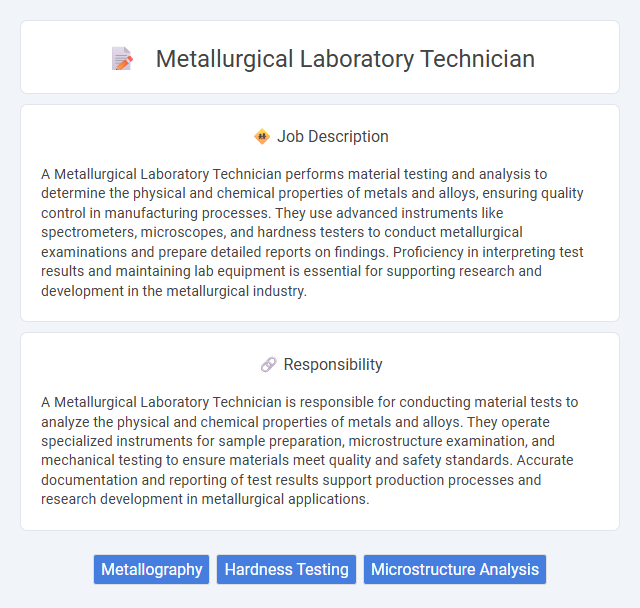
A Metallurgical Laboratory Technician performs material testing and analysis to determine the physical and chemical properties of metals and alloys, ensuring quality control in manufacturing processes. They use advanced instruments like spectrometers, microscopes, and hardness testers to conduct metallurgical examinations and prepare detailed reports on findings. Proficiency in interpreting test results and maintaining lab equipment is essential for supporting research and development in the metallurgical industry.
Individuals with strong analytical skills and a keen attention to detail are likely suitable for a metallurgical laboratory technician role, as it involves precise testing and analysis of metal properties. People who prefer hands-on work in controlled environments and can maintain meticulous records might find this job fulfilling. However, those uncomfortable with repetitive tasks or chemical exposure probably will not thrive in this position.
Qualification
Metallurgical laboratory technicians typically require a diploma or degree in metallurgy, materials science, or chemical engineering to perform precise material testing and analysis. Proficiency in operating advanced testing equipment such as spectrometers, microscopes, and hardness testers is essential for accurate evaluation of metal properties. Strong knowledge of quality control standards, metallurgical processes, and data interpretation ensures reliability in producing metallurgical reports and supporting manufacturing improvements.
Responsibility
A Metallurgical Laboratory Technician is responsible for conducting material tests to analyze the physical and chemical properties of metals and alloys. They operate specialized instruments for sample preparation, microstructure examination, and mechanical testing to ensure materials meet quality and safety standards. Accurate documentation and reporting of test results support production processes and research development in metallurgical applications.
Benefit
A Metallurgical Laboratory Technician role likely offers opportunities to develop specialized skills in materials analysis and quality control, enhancing career growth prospects. Benefits may include hands-on experience with advanced testing equipment and collaboration with engineering teams, which can broaden technical expertise. There is a probability of competitive salaries and access to professional development programs within industries such as manufacturing and mining.
Challenge
Metallurgical laboratory technician roles likely involve significant challenges in accurately analyzing metal properties and ensuring quality control under strict safety and precision standards. The probability of encountering complex problem-solving scenarios increases as technicians must interpret data from advanced testing equipment and adapt to evolving metallurgical technologies. Success in this position may depend on strong attention to detail and continuous learning to manage these demanding technical tasks effectively.
Career Advancement
Metallurgical laboratory technicians play a crucial role in analyzing metal properties and ensuring material quality in industries such as manufacturing and construction. Career advancement opportunities include progressing to senior technician roles, supervisory positions, or specializing in areas like materials research and quality control. Gaining certifications and pursuing further education in metallurgy or materials science enhances prospects for leadership roles and technical expertise development.
Key Terms
Metallography
Metallurgical laboratory technicians specializing in metallography perform critical analysis of metal microstructures using optical and electron microscopes to assess material properties and quality. They prepare polished samples through precise cutting, mounting, grinding, and etching processes to reveal grain size, phase distribution, and defects. Accurate metallographic examination supports failure analysis, quality control, and the development of advanced alloys in industries such as aerospace, automotive, and manufacturing.
Hardness Testing
A Metallurgical Laboratory Technician specializing in Hardness Testing performs precise evaluations of metal samples using methods such as Rockwell, Brinell, and Vickers hardness tests to determine material strength and durability. This role requires expertise in preparing test specimens, operating hardness testing equipment, and analyzing data to ensure compliance with industry standards like ASTM and ISO. Accurate hardness measurements are critical for assessing weld quality, heat treatment efficacy, and predicting the performance of metals in various engineering applications.
Microstructure Analysis
Metallurgical laboratory technicians specializing in microstructure analysis use advanced microscopy techniques such as optical microscopy, scanning electron microscopy (SEM), and X-ray diffraction (XRD) to examine material grain size, phase distribution, and defects. They prepare metallographic samples through sectioning, mounting, polishing, and etching to reveal microstructural features critical for assessing material properties and performance. Their precise analysis supports failure investigations, quality control, and research and development in industries like aerospace, automotive, and materials science.
 kuljobs.com
kuljobs.com